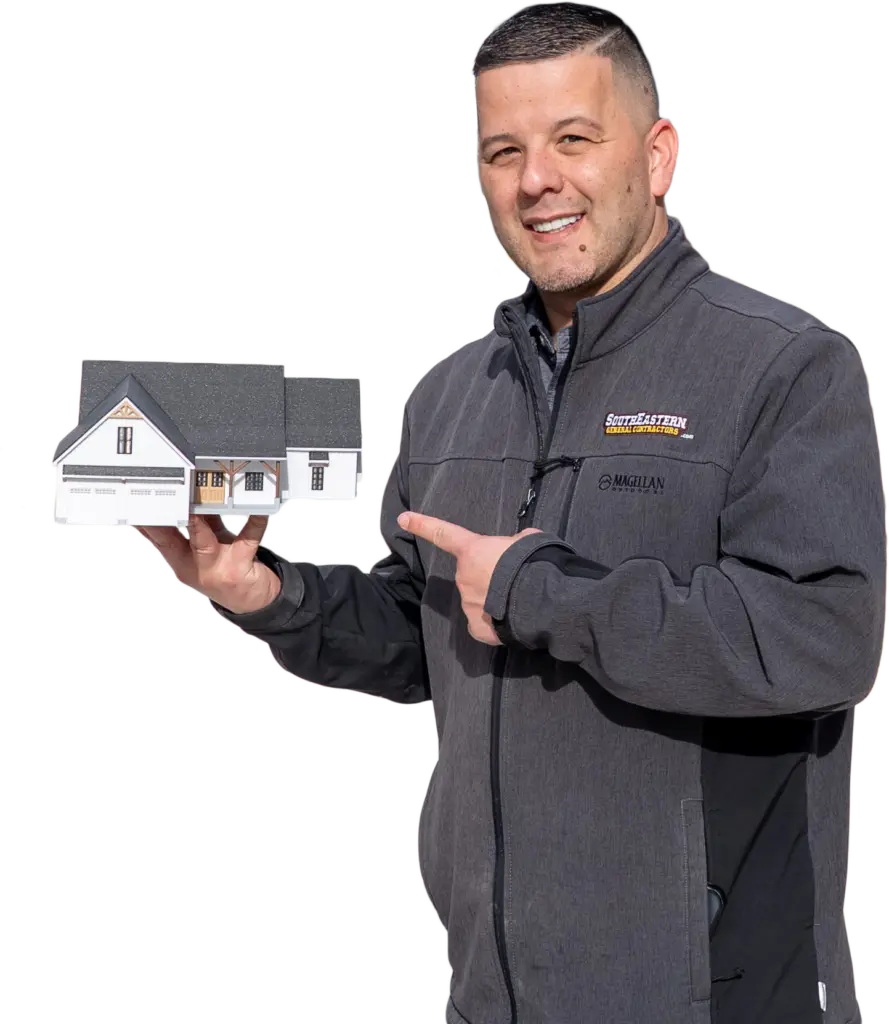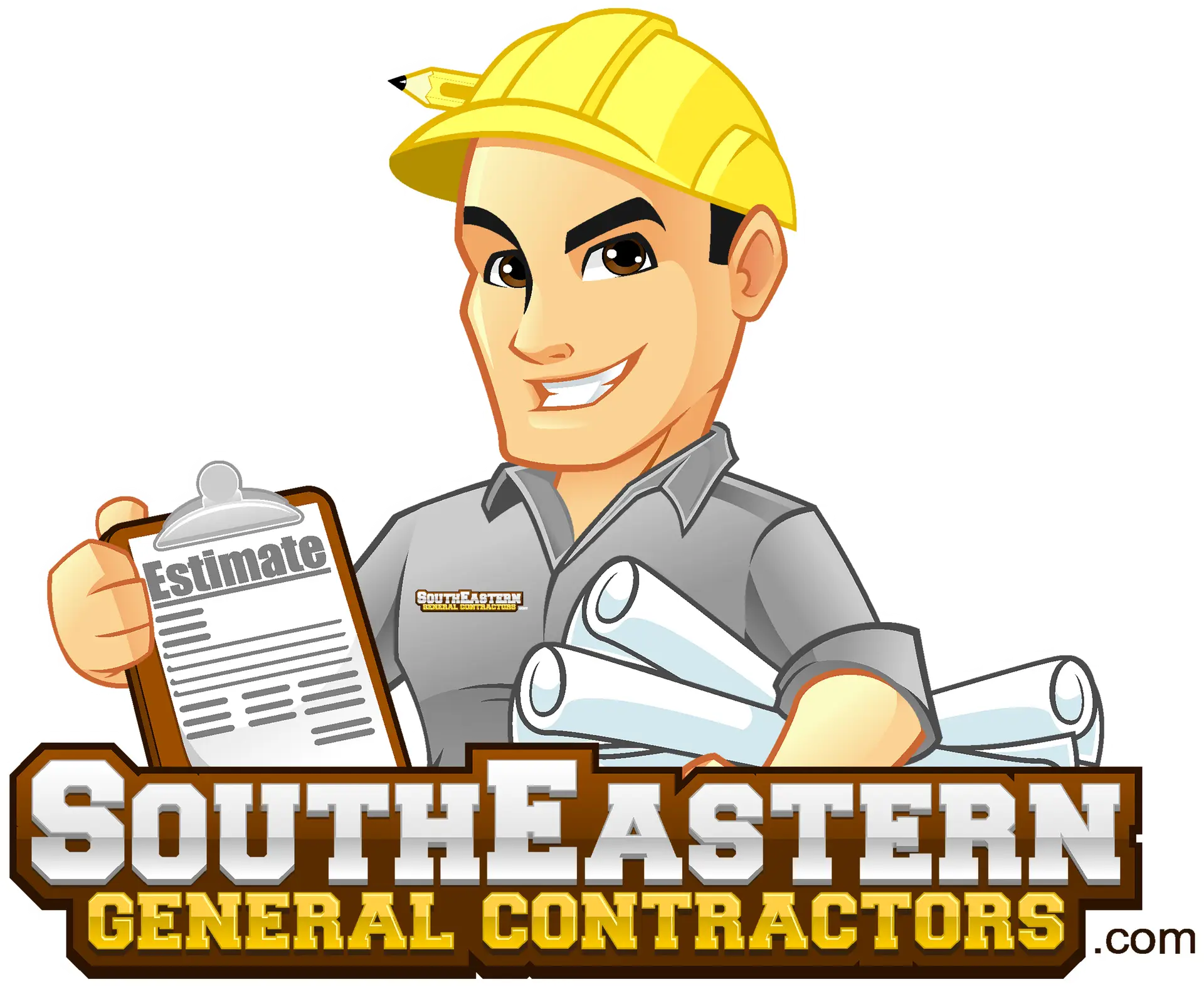
Trusted Home Builders in Fayetteville North Carolina | Building Legacies, Not Just Structures
So, you’re thinking about building a custom home. That's a huge deal—probably one of the biggest investments you'll ever make. And if you're setting your sights on Cumberland County, your first major hurdle is picking from the many home builders in Fayetteville North Carolina. This isn't just about finding someone who can read a blueprint; it’s about finding a true partner to build your future. This guide is here to empower you with actionable insights to make that choice with confidence.
Your Dream Home Journey Starts Here
Building in Fayetteville, NC, is a fantastic choice. You're not just getting a house; you're becoming part of a city with a ton of history and a real sense of community. This guide is here to help you cut through the noise and figure out how to choose the right builder. We're going to skip the generic advice and get into the nitty-gritty of finding someone who gets what you're trying to do—someone who understands they’re not just pouring a foundation, but laying the groundwork for your family's legacy.
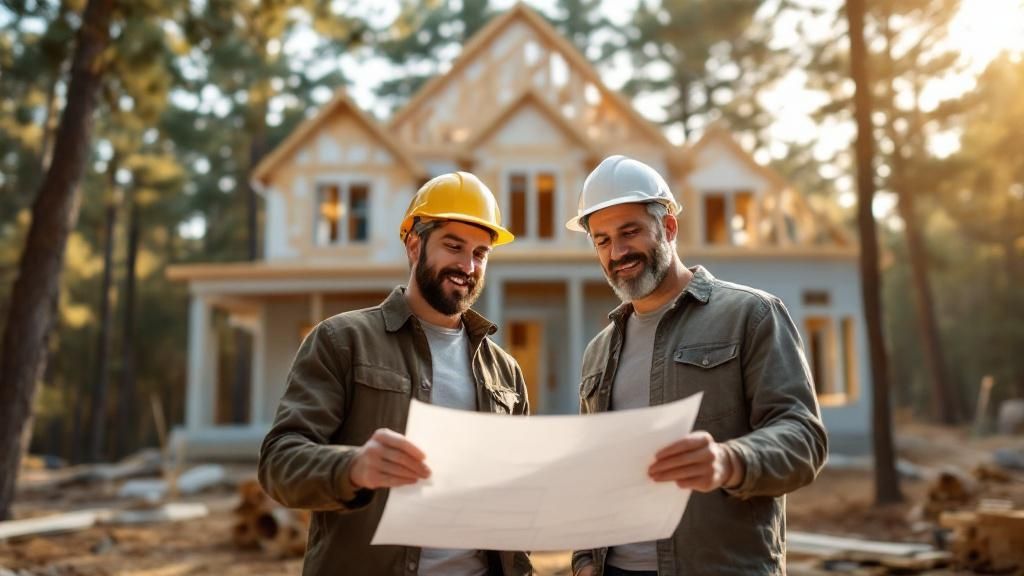
Honestly, this whole process boils down to a partnership. It has to be built on trust, open communication, and an absolute obsession with quality. The right builder doesn't just hand you a stack of floor plans. They sit down, listen to your dreams, respect your budget, and offer advice backed by years of building right here in this area.
More Than A House, It’s A Legacy
Here at South Eastern General Contractors (SEGC), we don't just see lumber and drywall. We see a legacy taking shape. With over 21 years of proven results, we've built our reputation on earning our clients' trust and delivering work that speaks for itself. We're a local, Native American-owned company, and our 8(a) and HUBZone certifications aren't just fancy badges—they represent a level of accountability and dedication that’s been put to the test and proven time and again.
Our roots run deep in the Fayetteville and Lumberton communities. We know this land. We know the best local tradespeople. We know exactly what it takes to build a home that will not only look beautiful but will also stand strong against everything North Carolina weather can throw at it.
"A home is the cornerstone of a family’s story. Our mission is to ensure that story begins with a foundation of trust, quality, and a genuine partnership. We build homes we would be proud to live in ourselves."
This idea of building a legacy is part of Fayetteville's DNA. The city's own history is tied to home building. Think about the old mill villages like Massey Hill, which popped up around 1898. That construction wasn't just about putting up houses; it was about creating a community that helped the city thrive. You can explore more about Fayetteville's historical development and see how it all connects. That history is what inspires us today: to build homes that make our community stronger, one family at a time.
Why Your Builder Choice Matters Most
Let's be blunt: choosing your builder is the most important decision you'll make. This one choice will dictate everything from your stress level over the next year to how much you love your home a decade from now.
A great builder brings so much more to the table than just construction know-how. They deliver:
- Total Transparency: You’ll always know what’s happening, from the first sketch to the final walkthrough. No smoke and mirrors.
- Financial Guardianship: They treat your budget like it’s their own, with crystal-clear accounting and honest advice.
- Expert Problem-Solving: When (not if) a surprise pops up, they handle it with calm, creative solutions, not panic.
- A-Team of Craftsmen: They have a go-to network of trusted, top-tier subcontractors who are just as committed to quality as they are.
Think of it like this: your vision is the "what," and your builder is the "how." If those two things don't align, you're in for a world of frustration. But when you find the right fit—the kind of partnership we work to create at SEGC—the process is actually enjoyable. The result? A home that’s even better than you imagined. We're here to be your guide, making the complex simple and turning your dream into a reality.
Start your search for a Fayetteville home builder with this quick overview of the essential factors to consider.
Key Builder Vetting Criteria At A Glance
| Vetting Factor | Why It Matters for Your Build | Our Commitment to Excellence |
|---|---|---|
| Local Experience | Deep knowledge of local codes, soil conditions, and the best subcontractors in the Fayetteville area. | With 21 years in the region, we know Fayetteville and Lumberton inside and out, ensuring a smoother build. |
| Certifications & Licensing | Proof of legitimacy, accountability, and adherence to industry standards. Protects you from risk. | We hold prestigious 8(a) and HUBZone certifications, signifying federal-level vetting and reliability. |
| Client Testimonials | Real-world feedback on communication, quality, and the overall client experience. | We pride ourselves on building lasting relationships and are happy to share references from past clients. |
| Transparent Process | Clear communication on budgets, timelines, and decisions keeps you in control and eliminates surprises. | Our process is built on open dialogue, ensuring you're a partner in every decision from start to finish. |
| Portfolio of Work | A visual track record of their quality, style, and capability to handle a project like yours. | Our diverse portfolio showcases our commitment to quality craftsmanship across various custom home styles. |
This table is a starting point, but the real test is in the conversations you have. A good builder will welcome your questions and be ready to prove they’re the right choice for your family’s legacy.
Understanding the Fayetteville Home Building Market
So, you're thinking about building a custom home in Fayetteville. Smart move. But before you start bookmarking floor plans and drooling over kitchen islands, let's talk about the lay of the land. The home-building scene here is its own unique beast, shaped by Fort Liberty, our Southern history, and some seriously steady growth. Getting a handle on this from the get-go will save you a world of headaches later.
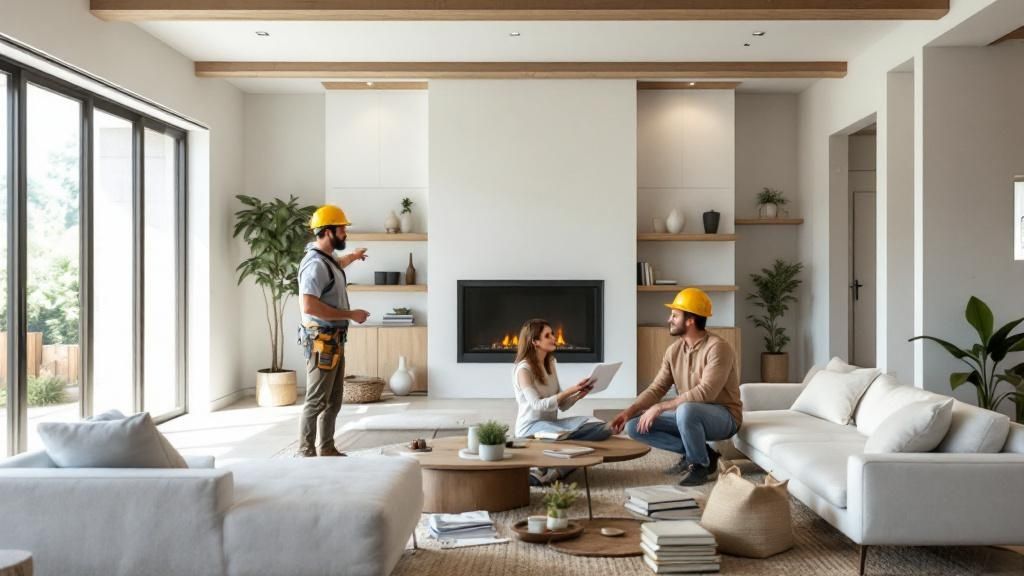
Unlike some cities where a couple of giant corporations build everything, Fayetteville has a great mix. You’ve got the big-name production builders stamping out entire neighborhoods, but you also have dedicated custom home builders who live for the one-of-a-kind projects. Neither is "better"—they just play different games. Your first job is to figure out which game you want to play.
Custom Crew vs. Production Powerhouse
Let's break it down.
A production builder is your go-to for speed and predictability. They’ve got a menu of floor plans, a set list of finishes, and a process that runs like a well-oiled machine. They buy up huge tracts of land, which helps keep costs down. If you find a layout you love and just want to get it done without a fuss, this is a fantastic option.
Then there’s the custom home builder. We're the folks you call when you've got a vision that won't fit into a pre-made box. This is for when you want to argue about the perfect spot for a window to catch the morning sun or design a mudroom that can actually handle your family's chaos. At South Eastern General Contractors, this is what gets us out of bed in the morning. We don’t just stack lumber; we take your daydreams and turn them into a real, physical home.
Knowing which team you’re on—Team Pre-Selected or Team Blank Canvas—is the single most important first step. It instantly cuts your search in half and points you toward the right kind of expert.
What Makes The Fayetteville Market Tick?
A few local quirks really drive the building scene here. First and foremost, the constant motion of military families from Fort Liberty means there's always a steady demand for quality housing. This keeps builders on their toes and has shaped the kinds of homes people want—functional, durable, and located in communities that feel like, well, a community.
You'll also notice a fun mix of styles. Classic brick ranches and traditional two-story homes are everywhere and for good reason—they're timeless. But we're also seeing a huge surge in modern farmhouses and cool transitional designs that mix old-school charm with clean, modern lines. A great builder gets these trends, but more importantly, they know how to build a house that can stand up to a hot, humid North Carolina summer without breaking a sweat.
We’ve been at this for 21+ years right here in Fayetteville. That kind of deep local knowledge is our secret weapon. We know which materials laugh at humidity, which subcontractors show up on time and do killer work, and how to slice through the local permitting red tape. This isn't just a job site for us; it's our backyard.
The Unsung Heroes: The Home Builders Association
The Fayetteville market is buzzing, with around 19 home builders working across 32 different subdivisions at any given time. The organization that keeps this whole orchestra in tune is the Home Builders Association of Fayetteville (HBAF).
Think of the HBAF as the industry's quality control. They push for professionalism, keep members up-to-date on the latest codes, and advocate for high standards. When you see a builder is an active member, it's a good sign they're serious about their craft. It's a promise of accountability.
As a Native American-owned, 8(a) and HUBZone certified firm, we live and breathe that commitment. Earning those certifications is no joke; it’s a tough vetting process that proves you’re accountable and reliable. It’s one more reason you can trust you're working with a partner who’s in it for the long haul, building a legacy right alongside you.
Creating Your Builder Shortlist
Alright, now for the fun part. You've got the lay of the land, so let's start narrowing down the contenders and creating a solid shortlist. The goal isn't to find every builder with a hammer in Cumberland County; it’s about zeroing in on the few who can actually turn your dream home into a reality. This is where the real work begins.
Forget casting a wide, hopeful net into the sea of Google results. You need a smarter approach. Think of it less like fishing and more like using a precision-tuned sonar to pinpoint the absolute best crews in the area.
Where To Look For Quality Builders
Starting your search in the right places will save you a world of headaches. Ditch the endless scrolling and focus your energy on these goldmines of information:
- The Home Builders Association of Fayetteville (HBAF) Directory: Like we said before, this is your ground zero. HBAF members have already demonstrated a commitment to their craft and the local industry. It's basically a pre-vetted list of serious professionals.
- Word-of-Mouth Referrals: This one's a classic for a reason. Ask friends, family, or coworkers in the Fayetteville area who they used for a recent build or major renovation. A glowing personal recommendation is invaluable, but always, always back it up with your own research.
- Real Estate Agents: The good agents, especially those specializing in new construction, know who's who. They see the finished products and hear the client feedback, so they know which home builders in Fayetteville North Carolina consistently deliver on quality and stay on schedule.
- Drive Through Inspiring Neighborhoods: See a new home that makes you stop and stare? Look for the builder's sign out front. There's no better way to get a feel for a builder's current style and quality of work in the wild.
Evaluating A Builder’s Portfolio
Once you’ve got a handful of names, it's time to put on your detective hat. A builder's portfolio is their professional resume, and you need to inspect it with a sharp eye. Look past the glossy, sun-drenched photos and really analyze what you're seeing.
Does their style vibe with what you have in mind? Do they build a range of homes, or are they a one-trick pony? Get granular and look at the details—the trim, the material choices, the way things fit together. These little things scream volumes about a builder's commitment to craftsmanship. At SEGC, we’re incredibly proud of our portfolio because it represents over 21 years of building with care in both Fayetteville and Lumberton.
A great portfolio isn't just a highlight reel. It should tell a clear story of quality, consistency, and happy clients. It's the tangible proof that a builder can walk the walk. We believe our work speaks for itself, showcasing a legacy of structures built with integrity.
To give you a better sense of the road ahead, here’s a look at a typical timeline for a custom build right here in Fayetteville.
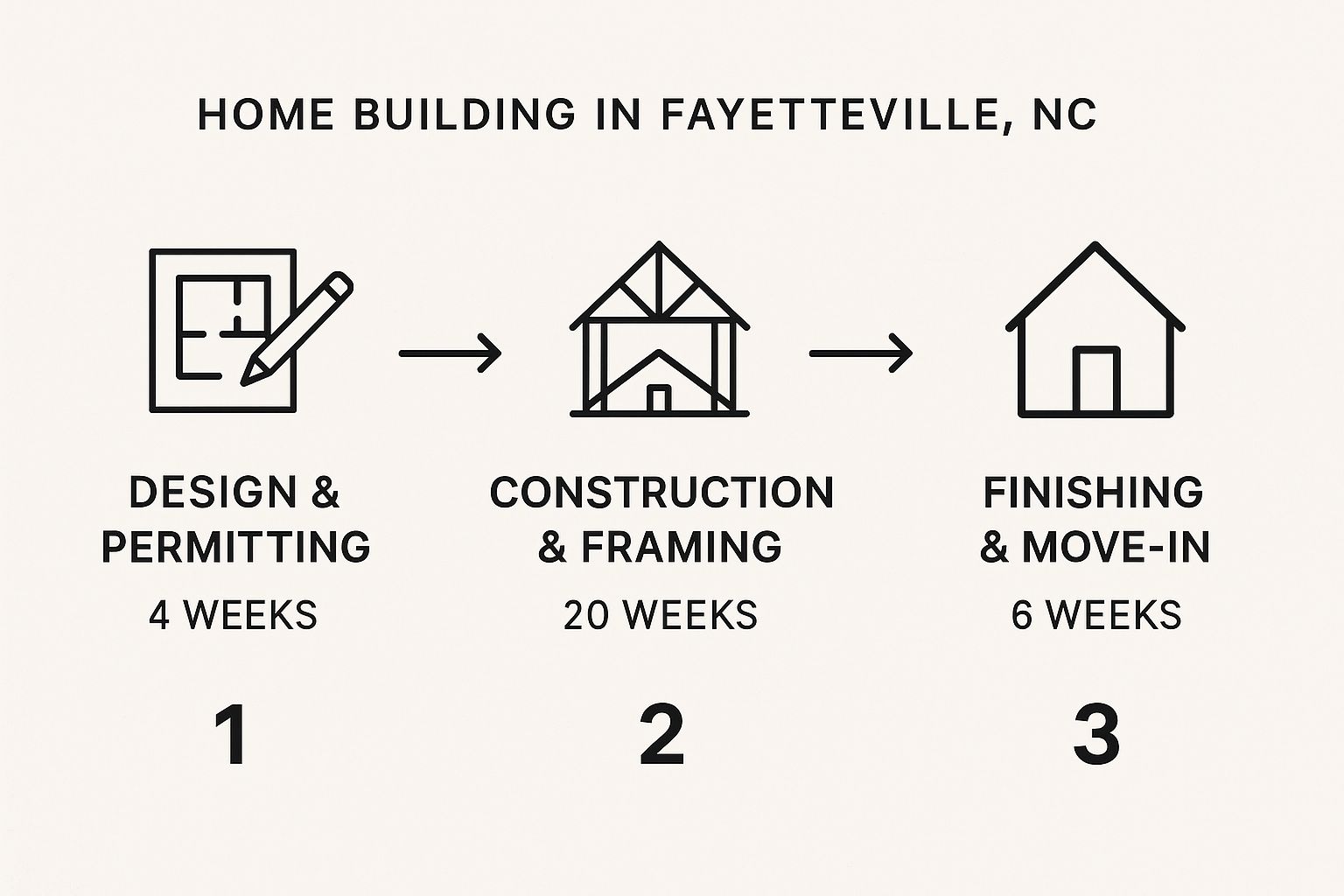
As you can see, while the actual construction phase is the longest, the upfront design and final finishing touches are absolutely essential for getting the result you want.
Looking Beyond The Blueprint
Finally, dig for credentials that prove a builder is truly reliable. Anyone can say they're trustworthy, but certain certifications offer objective proof that they've been put through the wringer.
Take our status as a Native American-owned, 8(a), and HUBZone-certified firm, for example. Those aren't just fancy labels. They are hard-earned federal designations that come with a serious vetting process. They speak to our financial stability, operational integrity, and a proven track record of getting the job done right.
For a homeowner, these certifications are like a powerful, third-party stamp of approval. It’s confirmation that you're partnering with a business held accountable at the highest levels. Getting this level of verification is a critical step, and our detailed guide on how to find a good contractor dives even deeper. This is how you build a shortlist with real confidence—by focusing on partners who aren’t just building houses, but building legacies.
How To Interview A Potential Builder
Alright, you’ve done your homework and narrowed down the list of builders. Now for the most important conversation you’ll have during this whole process: the interview. Think of it less like a polite chat and more like an audition. You're trying to find a builder whose answers prove they have the chops, the honesty, and the dedication to bring your vision to life.
The really good builders, the ones with deep roots in the community and a reputation to protect, actually love this part. They welcome the tough questions. Why? Because they're proud of how they work and confident they can deliver. It’s this exact conversation that builds the foundation of trust you need for a project this personal.
Going Beyond The Sales Pitch
Let's be real—every builder has a sales pitch. Your job is to peel back that shiny veneer and see how they really operate when the pressure is on. This is where you get into the nitty-gritty of their process.
Kick things off by talking about communication. Who, specifically, will be your go-to person? How often will you hear from them, and will it be a call, an email, or a carrier pigeon? If you get vague answers here, that's a huge red flag. A pro will have a system. After more than 21+ years of building homes in Fayetteville and Lumberton, we’ve learned that consistent, clear communication is the secret sauce to a stress-free project.
Next, you need to talk money and timelines. How a builder handles the budget speaks volumes about their integrity.
- Ask for a sample budget. Is it detailed, or just a few numbers on a napkin? Does it have allowances for things like tile and countertops, and are those numbers realistic for the quality you’re picturing?
- Drill down on their change order process. What happens when you want to upgrade the faucets or an unexpected issue pops up? How do they track and approve those costs?
- Talk about their schedule. How do they keep everything on track? Do they use specific software or just a well-worn calendar?
These aren't just random questions; they shift the conversation from vague promises to concrete, real-world processes.
Gauging Their Team And Their Track Record
A builder is only as good as the crew they bring to the job site, and that absolutely includes their subcontractors. The best home builders in Fayetteville North Carolina have spent years building solid relationships with the most skilled and reliable plumbers, electricians, and carpenters in the area.
Ask them straight up how they choose their subs. Do they have a trusted team they work with time and again, or are they just chasing the lowest bid for every job? The answer tells you whether they prioritize quality or just cutting corners. A builder who cares about craftsmanship will have a roster of artisans they'd trust with their own home.
One of our project managers always tells clients to ask this zinger: "Tell me about a time a project got derailed because of a subcontractor. How did you fix it, and what was the final result for the homeowner?" How a builder handles a crisis is the ultimate test of their professionalism.
It also helps to know what's happening in the wider market. Looking at economic data on things like local building permits and house price trends can give you a solid benchmark. You can find these stats from places like the St. Louis Federal Reserve. A builder who’s paying attention to these trends is better prepared for whatever the local economy throws at them. You can see these housing market statistics for North Carolina yourself to get a feel for the landscape.
The All-Important Warranty Question
Whatever you do, don't wrap up the interview without talking about the warranty. This is their written promise to stand behind their work long after you've unpacked the last box.
What, exactly, does their warranty cover, and for how long? Do they service it themselves, or do they hand you off to a third-party company? What's the process if you need to make a claim? A builder who is truly confident in their work will have clear, straightforward answers to all of this. We believe this conversation is so critical that we’ve created a whole list of questions you should ask any general contractor before you even think about signing on the dotted line.
This interview is your chance to find a true partner for your dream home. By asking direct, insightful questions, you’ll find a builder whose values and processes align with yours—a partner whose 8(a) and HUBZone certifications are proof of an unwavering commitment to quality.
Time for a Background Check: Verifying Credentials and Talking to Real People
So, you’ve had a great conversation with a builder. You’re feeling good, maybe even excited. That’s fantastic, but don’t pop the champagne just yet. Now comes the part of the process that I call the "trust but verify" phase. It’s where you separate the smooth talkers from the true professionals. Think of it as your own private investigation—it's not about being suspicious, it's about being smart with what's likely the biggest investment of your life.
Your first move is a quick trip to the digital offices of the North Carolina Licensing Board for General Contractors. You can look up any of the home builders in Fayetteville North Carolina on your shortlist here. Is their license active? Is it in good standing? This is a non-negotiable, black-and-white check. An active license is the absolute baseline, proving they’ve met the state’s minimum requirements for competence and financial stability. No license, no conversation. End of story.
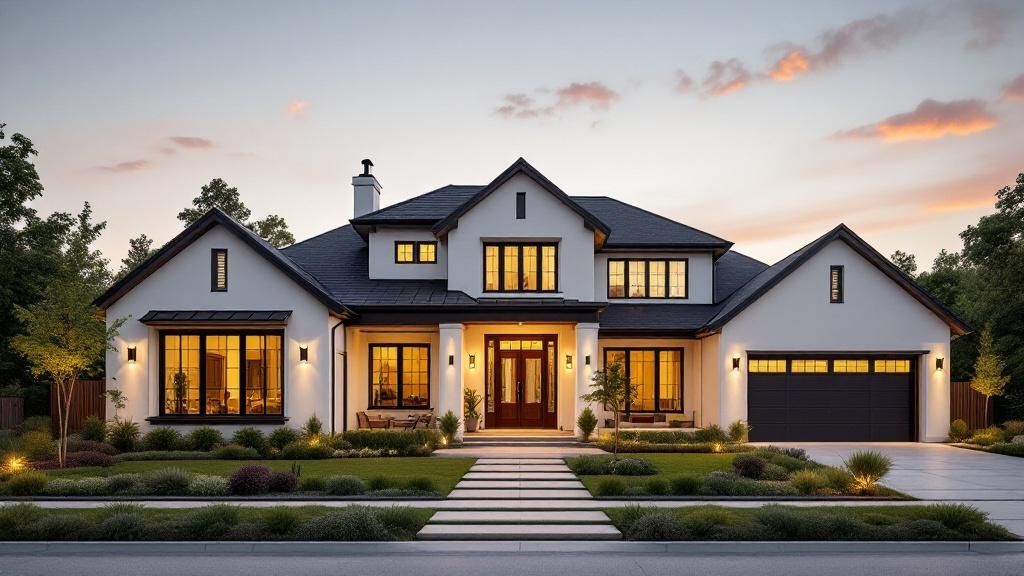
Next up: insurance. Ask them to show you their certificates for General Liability and Worker's Compensation. A pro will have these on hand and won't bat an eye. If they hesitate or make excuses, that’s a massive red flag. This paperwork is what protects you from any liability if someone gets hurt on your property or if accidental damage occurs. Without it, you’re exposed.
Getting Past the Polite "Yes"
Once the paperwork checks out, it's time to chat with their past clients. But please, don't just ask, "So… were you happy?" Anyone can get a polite "yes" to that. You need to dig for the real story.
You’re not looking for a simple thumbs-up. You're trying to get a feel for their process, their communication habits, and most importantly, how they react when things don't go according to plan. Because trust me, something always comes up.
Here are the kinds of questions that get you the truth:
- "Tell me about a time something went wrong. How did the builder handle it?"
- "Was the project manager easy to get a hold of? Did you feel like you were in the loop?"
- "How did the final, all-in cost compare to the initial budget you discussed?"
- "Knowing what you know now, what's one piece of advice you'd give me about working with them?"
These questions peel back the curtain. The answers will give you a much clearer picture of what it’s really like to be their client.
A builder’s true colors don’t show when the sun is shining and materials arrive on time. You see their character when a lumber shipment is late, a subcontractor calls in sick, or a freak thunderstorm rolls in. A pro communicates and solves the problem. An amateur creates drama and stress.
Why Vetted Credentials Matter So Much
This whole verification dance is precisely why certain official certifications mean so much in this industry. At South Eastern General Contractors, we're immensely proud of our credentials because they represent this same level of intense scrutiny, just on a federal level.
Being a Native American-owned, 8(a), and HUBZone-certified firm isn't just a collection of fancy titles. It means we’ve been put under a microscope by the government—they’ve audited our finances, our operational history, and our performance on past projects. It's tangible proof of stability and accountability, showing we meet the highest standards. For a homeowner, that's an extra layer of peace of mind, knowing you're working with a company that’s already been thoroughly vetted.
With over 21+ years of proven results in Fayetteville and Lumberton, we’re confident in our reputation. But we also believe that trust has to be earned. That's why we want every potential client to do their homework on us and anyone else they're considering. The financial aspect is a huge part of this, and to help you get a better handle on it, take a look at our breakdown of what a custom home builder's cost really covers. Doing your due diligence ensures you aren't just hiring a builder—you're choosing the right partner to bring your family's vision to life.
Got Questions About Building in Fayetteville? We've Got Answers.
Building a custom home is a huge deal, and it's only natural for your mind to be racing with questions. After more than 21 years of building homes in Fayetteville and Lumberton, we've pretty much heard them all. So, let's pull back the curtain and get you some straight answers based on decades of real, on-the-ground experience.
Our job is to make this process feel less like a mystery and more like an adventure. Let's dive into the big questions we hear most often from folks dreaming about building with one of the many home builders in Fayetteville North Carolina.
What's a Realistic Timeline for a Custom Home Here?
This is always the first question, and the honest-to-goodness answer is: it depends. For a truly custom home in the Fayetteville area, you should realistically plan for 9 to 14 months from the day we start moving dirt. That window can shift based on how complex your design is, the sheer size of the home, and what kind of prep work your land needs.
The whole journey has a few key chapters:
- The Blueprint Phase: This is where we nail down designs, get the engineering just right, and handle all the permitting with Cumberland County. It’s the critical groundwork that sets the stage for a smooth build and can take a few weeks or a couple of months.
- The Build Itself: This is the main event. It covers everything from pouring the foundation and raising the walls to running every wire and pipe.
- The Fun Part (Finishes!): This is where your personality really starts to shine through with flooring, paint, cabinets, and light fixtures.
- The Home Stretch: We wrap up with final inspections, your personal walkthrough, and the best part—handing you the keys.
Any builder worth their salt won't just throw out a number. They'll walk you through a detailed project schedule and keep you in the loop about any hiccups, whether it’s a week of bad weather or a delay on a specific material.
How Much More Does a Custom Home Really Cost?
It’s true, a custom home can cost 15% to 30% more than a production home of a similar size. But that number doesn't capture the whole picture. What you're really paying for is control. Total, absolute control. You’re not buying a house off a menu; you're creating a home designed for your life, on your land, with materials you picked out yourself.
That control is actually your best friend when it comes to budgeting. You get to decide where to invest your money. Maybe you go all-out on a chef's kitchen but choose more budget-friendly finishes for the guest rooms. It’s all about putting your money where it matters most to you.
At SEGC, we see ourselves as your financial guide through this process. Our job is to help you match that big vision in your head with a budget that feels comfortable, ensuring there are no nasty surprises along the way—just fantastic quality and a home built to last.
What Should I Look for In a Builder's Contract?
Think of the builder's contract as your project's constitution. If it’s vague, run. A good, solid contract will be incredibly detailed and should spell out a few non-negotiable things:
- A Detailed Scope of Work: It needs to list every single task, material, and even the brand/model numbers you agreed on. No ambiguity allowed.
- A Clear Payment Schedule: You should pay based on progress—like the foundation being poured or framing being complete—not just because it's the first of the month.
- A Specific Project Timeline: It should have clear deadlines for the major stages of the build.
- A Formal Change Order Process: Life happens and you might change your mind. The contract must explain exactly how those changes are requested, approved, and paid for.
- A Comprehensive Warranty: What’s covered, for how long, and how do you make a claim? It all needs to be in writing.
We always tell our clients to have a lawyer look over any builder contract before they sign. We build our contracts at SEGC to be completely transparent because we believe trust is built from day one.
How Does Local Fayetteville Experience Help My Project?
Local experience isn't just a nice-to-have; it's a game-changer. A builder who knows Fayetteville and Lumberton inside and out brings advantages that an out-of-town company just can't replicate. We’ve spent years building relationships with the best local crews and suppliers, which translates to better quality work and a more reliable schedule for you.
More than that, we have an intimate knowledge of local building codes, soil types, and exactly what it takes to build a home that can stand up to the North Carolina climate. That expertise means fewer headaches, a higher-quality final product, and a smoother, more cost-effective build. As a Native American-owned, 8(a), and HUBZone-certified firm, this is more than just business to us—it's about building up the community we call home.
Ready to turn that dream into a driveway? At South Eastern General Contractors, we don’t just build houses; we build legacies. With 21+ years of proven results and a deep commitment to our clients, we're ready to be your partner on this journey. Let’s build your future, together.
Start the conversation about your dream home with SEGC today.


